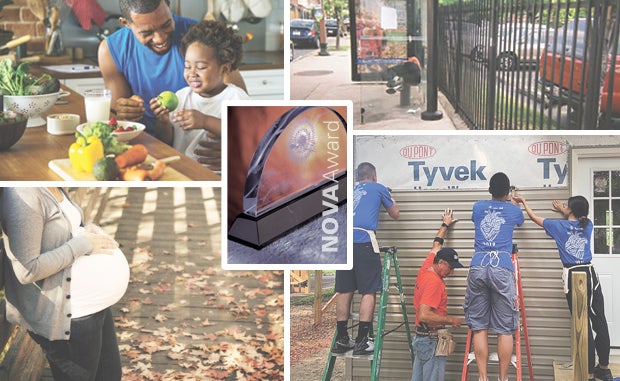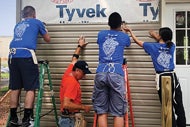

Collaboration Drives Community Health Improvements

With the challenges facing resource-stretched hospitals and health systems today, collaboration is needed more than ever to advance community health. Each year, the AHA Dick Davidson NOVA Award program recognizes as many as five bright stars in health care for their work to improve community health in collaboration with other community stakeholders.
A new AHA resource highlights the work of all five NOVA Award recipients. Here’s a brief look at their stories:
 Baltimore City Hospitals Help Connect the Dots Between Health and Housing
Baltimore City Hospitals Help Connect the Dots Between Health and Housing
Baltimore city hospitals came together and partnered with Health Care for the Homeless to provide intensive support services — like home health care visits, transportation and education, substance use treatment and mental health issues — that were needed to improve the health of individuals experiencing homelessness. What makes the program unique is that all Baltimore city hospitals are participating and are making investments in their local jurisdictions. So far, the program has provided 121 homes that house 202 people.
 Carilion Clinic Tackles Social Determinants by Feeding Community Need
Carilion Clinic Tackles Social Determinants by Feeding Community Need
Through the Health Roanoke Valley (HRV) initiative, a collaborative of 50 community organizations, Carilion Clinic developed evidence-based strategies to tackle critical issues like food insecurity. It launched a 12-week Fresh Foods Rx program, providing participants with nutrition and health education in the primary care setting and weekly prescriptions for fresh fruits and vegetables. A larger, more encompassing initiative, HRV’s Pathways HUB program, enabled at least 543 community members to access health care, social services, education and employment. During an 18-month pilot program, enrolled clients saw a 67% decrease in avoidable emergency department visits.
 Hackensack Meridian School of Medicine Infuses Human Dimension into Medical Education
Hackensack Meridian School of Medicine Infuses Human Dimension into Medical Education
In addition to an extensive medical education that includes diagnosis and treatment of illnesses, the Hackensack Meridian School of Medicine’s new three-year Human Dimension course places more emphasis on the social determinants of health. Regardless of their specialty, medical students need to understand the importance of socio-economic and behavioral factors in health. What makes this program unique is that students are assigned to follow specific families throughout the course. When needed, the students connect the families to community agencies and other collaborative partners. Among the 60 students in the inaugural class and 90 students in the second class, the 75 student pairs are helping 150 families.
 Memorial Healthcare System Helps Women Beat Drug Addiction and Deliver Healthy Babies
Memorial Healthcare System Helps Women Beat Drug Addiction and Deliver Healthy Babies
In 2015, when the number of babies born with neonatal syndrome in Broward County, Fla., reached 600, Memorial Healthcare System reached out to other community providers. Together, they launched the Mothers in Recovery program to provide rapid access to opioid-addiction treatment for pregnant women through Memorial’s five emergency departments. The program is unique in that it offers an evidence-based, phased approach to treating substance-use disorders in pregnancy, combining the use of medications with recovery support and psychotherapy services. Mothers in Recovery served 146 women between May 2015 and the end of May this year. Of 137 babies born to those patients, 125 (91%) were born drug-free.
 Vail (Colo.) Health Boosts Access To Behavioral Health
Vail (Colo.) Health Boosts Access To Behavioral Health
Colorado’s Eagle County became a hot spot in the nation’s “suicide belt” in 2017 and 2018 when its suicide rate skyrocketed to 183% above historical averages. In response, Vail Health started Eagle Valley Behavioral Health (EVBH) in 2019, a collaborative effort that grew out of a grassroots model and serves as a behavioral health hub. It strives to eliminate barriers and increase access to behavioral health care by targeting all segments of the social, environmental and health care continuum. During its first year, Vail Health saw a 70% reduction in behavioral health crisis transports to the emergency department. EVBH also has worked with the Eagle County Schools and the Hope Center to place one full-time behavioral health clinician in every middle school and high school in the district, where 24% of the students seen by clinicians were at high risk for suicide.
All of the program models of these five NOVA Award recipients can be replicated by other hospitals or health systems. To read more, visit the AHA website. Applications for the 2021 NOVA Awards are due Nov. 23.



